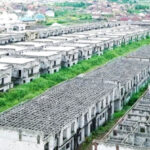The Nigerian Electricity Regulatory Commission (NERC) has approved an increase in the price of pre-paid electricity metres under the Meter Asset Providers (MAP) scheme in the country.
In an order signed and dated September 5, 2023, by the commission’s chairman and Commissioner for Legal, Licencing, and Compliance, Sanusi Garba and Dafe Akpeneye, respectively, it stated that a single phase pre-paid metre would now cost N81,975.16k from the N58,661.69k while a three-phase pre-paid metre is increased to N143,836.10k from N109,684.36k.
The implication is that electricity consumers will have to pay an additional N23,313.64 for a single-phase metre, which is 40 per increment, and N34,151.76 to get a three-phase metre, representing a 31 per cent increase.
The order however said the price is exclusive of VAT, stating N842.80 per unit would be added to single-phase metres while N1,100 would be added to three-phase metres.
While stating that the order took effect from September 6, it said, “All MAPs shall supply metres previously paid for by end-use customers before the commencement of this order at the prevailing rate when payment was made by the customers without additional increase in cost.”
- UNICEF warns of $100bn economic loss over conflict in Northeast Nigeria
- Why we dismissed Atiku, Obi’s cases – Tribunal
It urged All DisCos and MAPs to develop and implement customer enlightenment of their metre rollout plans.
The order added that the new price was to ensure fair and reasonable pricing of metres to both MAPs and end-user customers.
But experts argued that the new price would make customers not buy the metres.
The CEO at Sage Consulting & Communications, Bode Fadipe, said every increase in the cost of the metre is a disincentive for metre penetration.
Fadipe noted that customers will become more withdrawn from metering as the cost of a single-phase metre is more than the national minimum wage of N30,000.
“Ordinarily, the provision of metre is not the business of the tenant. It is one of the things the owner of the property ought to provide. But whether the tenant or the owner of the property, the fact remains that someone has to pay for it.
“Correspondingly, the increase in the cost of metre will lead to higher estimated billing and theft of electricity because end users will seek ways and means of getting electricity without adequately accounting for it.
“But can you blame the metre providers? They are part of the Nigerian economy, which is currently buffeted by inflation that is unprecedented in the history of the nation. Nigeria has one of the highest inflation rates globally. The metre providers have different overhead costs and they are not in business for charity. It is therefore difficult to blame them for the Northward adjustment of the cost of the metre,” he said.
On what can be done, he said the MAP scheme needs to be strengthened to allow piecemeal payment which would enable end users not to feel the pain so much, especially with the current state of our economy.
The founder of Spark Nigeria, Chinedu Amah, noted that naturally, there would be challenges with the customers as an increase is impacting their already scarce resources.
He said the onus is on the industry to seek solutions beyond what has failed to produce results to increase metre offtake.
On his part, the President of Nigeria Consumer Protection Network, Kunle Olubiyo, said the increase was necessitated due to a recent increase in charges by the Nigerian Customs Services.
He said other factors for the increase are multiple charges by various institutions in charge of ports, the increasingly outrageous cost of doing business in Nigeria, and other built-in costs of doing business.

 Join Daily Trust WhatsApp Community For Quick Access To News and Happenings Around You.
Join Daily Trust WhatsApp Community For Quick Access To News and Happenings Around You.


